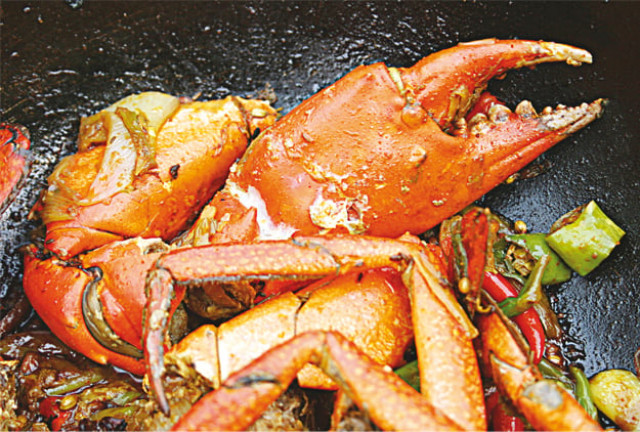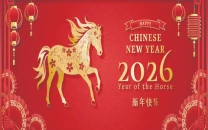Karachista: A foodie and a patriot
Restaurateur Mahmood Akbar gives an insight into his new cookbook and restaurant in London.

The restaurant offers contemporary desi food that Akbar proudly refers to as solely Pakistani. PHOTOS: PUBLICITY
This early love of food grew with him. He recalls how he was always the one preparing sandwiches for shikaar with his friends or the one ordering when they dined out. However, Akbar is no amateur. He studied hotel and restaurant management at the University of New Haven in Connecticut, United States. He managed restaurants in the US and was food and beverage manager for the Lahore Hilton Hotel (now Avari Hotel).
Presently, he runs a chain of successful restaurants under the Salt’n Pepper umbrella. These include the Salt’n Pepper family restaurants, the Village restaurants, the Anarkali Lounge banquet hall, Suk-Chen spa and café and The Grill. Salt’n Pepper franchises will open soon in Bahawalpur and Multan. Most recently, Akbar opened a Salt’n Pepper restaurant in Leicester Square, London.

Another one of his feats is his latest cookbook, named after his restaurant, in which he provides exact recipes for spice mixes like garam masala and chaat masala – recipes that he has fine-tuned over the years.
The menu at the London restaurant is based on the menus at the restaurant’s branches in Pakistan. All the same recipes are used and none have been altered to suit foreign palates. The only addition is chicken tikka masala, a peculiar British favourite that is not as popular in the subcontinent.
He explains that everything is made from scratch at his restaurants and how he abhors the fact that many restaurants, particularly those abroad, use packet mixes or bottled sauces for many dishes.
“Commercial masalas often use ascetic acid or Monosodium glutamate (MSG). Our food only includes fresh, premium, natural ingredients. We use no chemicals or additives and I refuse to use cheap, low quality ingredients in my restaurants. There is no reason why a domestic cook should not be able to do the same.”
Just like Greek, Spanish and Italian cuisines were once lumped together as ‘Mediterranean’, almost all desi food abroad is termed ‘Indian’.
“Internationally, most Indian restaurants offer North Indian food, which is closest in character to Pakistani cuisine. However, as a large number of the cooks are South Indian or Bengali, what we see abroad are adulterated versions of these dishes. Dishes that are very similar to Pakistani dishes are altered with the addition of coconut milk or curry patta until they are unrecognizable back home,” he says.

Akbar is adamant about describing his restaurant as solely Pakistani, even though most restaurants in England are referred to as ‘Indian and Pakistani’ in order to draw in more customers.
“Pakistani cuisine has a unique identity that is quite separate from Indian cuisine,” he explains. “While we have a shared heritage, Indian cuisine, as a whole, uses a far wider range of herbs and spices including hing, curry patta and a host of others. Pakistani recipes mainly use four main spices: mirch, dhaniya, zeera and haldi. With these basics, we can make dishes as varied as nihari and karahi chicken.”
Akbar laments the fact that Pakistani food has little or no identity of its own overseas. He explains that his intention behind writing the cookbook was not self-promotion or publicity for his restaurant chain, but to encourage people to explore what Pakistani food has to offer.
“Many would call me a fool for sharing the exact recipes used in my restaurants when other establishments closely guard their recipes. However, I have never shied away from sharing my recipes. I want more people to experiment with our cuisine,” says Akbar.

The book itself is gorgeous. Akbar is a keen photographer and has done most of the photography himself. An area where many local cookbooks fail, the food in the Salt’n Pepper cookbook glistens appetisingly. It is beautifully presented.
I remember once buying a book on curries in England and my mother scoffed at the methods, which admittedly were bizarre. Similarly, Nigella Lawson may be great to watch, but her recipes don’t always work, unlike Jamie Oliver’s, which are always spot on. Akbar’s recipes not only make sense, but they also work; the two I tried turned out to be delicious.
His hara bhara chicken masala was a treat. His biryani is very different from my mother’s biryani, but as we are originally from Mumbai, ours is more Indian-style biryani anyway. It comprises recipes of traditional Pakistani favourites, such as nihari, beef pasanday, karahi gosht and shahi tukray. It’s full of recipes I’m itching to try, including harissa, kunna and amrood ka halwa. For the first time ever, I may try to cook nihari without resorting to a pre-mixed masala packet.

The recipes have all been tested personally by Akbar, as reducing commercial recipes to domestic proportions is no easy task. The book includes recipes from all over Pakistan. Heritage recipes are one of Akbar’s passions and he has been known to sit for three days with famous dhabay-wallahs to learn the tricks of one dish or another. He then experiments with these techniques, incorporating the good into his food and discarding the bad. He speaks evocatively of such dishes, like flat chicken that is cooked with a stone on top of it.
It is fascinating to hear him talk about the history and provenance of various recipes and I wish these had been included in the book. While the recipes are great, cookbooks abroad often include a little background about and a little personal explanation for each recipe, which would have been a wonderful addition to Akbar’s cookbook.
In fact, one of Akbar’s dreams is to collect and document heritage recipes from all over Pakistan. Hopefully, when he shares those recipes, he will also share the captivating history behind each one.
Meanwhile, this cookbook serves as a comprehensive guide to the best of Pakistani cuisine. With its exquisite photography and well-tested recipes, it’s a must-read for any serious cook.
Oxford-grad Salima Feerasta is a social commentator and lover of style in any form or fashion. She blogs at karachista.com and tweets
@karachista
Published in The Express Tribune, January 9th, 2014.
Like Life & Style on Facebook, follow @ETLifeandStyle on Twitter for the latest in fashion, gossip and entertainment.



















COMMENTS
Comments are moderated and generally will be posted if they are on-topic and not abusive.
For more information, please see our Comments FAQ